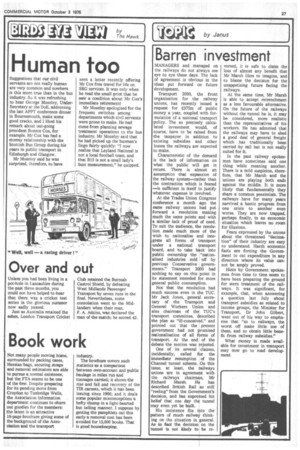Barren investment
Page 29

If you've noticed an error in this article please click here to report it so we can fix it.
MANAGERS and managed on the railways do not always see eye to eye these days. The lack of agreement is obvious in the ideas put forward on future development.
Transport 2000, the front organisation for the railway unions, has recently issued a request for £375m of public money a year, coupled with formulation of a national transport policy. The so precisely calculated investment would, of course, have to be raised from the taxpayer in addition to existing subsidies and other losses the railways are expected to make.
Characteristic of the demand is the lack of information on what the public will get in return. There is almost an assumption that expansion of the railway system—rather than the contraction which is feared —is sufficient in itself to justify whatever expense is involved.
At the Trades Union Congress conference a month ago the same railway unions had put forward a resolution making much the same points and with a similar lack of proof of need. To suit the audience, the resolution made much more of the wish to nationalise and integrate all forms of transport under a national transport board, and to take back into public ownership the "nationalised industries sold off by previous Conservative i governments." Transport 2000 had nothing to say on this point in its statement intended for more general public consumption.
Not that the resolution had much success even in the TUC. Mr Jack Jones, general secretary of the Transport and General Workers Union and also chairman of the TUC's transport committee, described the plan as "ill-conceived," and pointed out that the present government had not promised nationalisation of all forms of transport. At the end of the debate the motion was rejected.
One of its several clauses, incidentally, called for the immediate resumption of the Channel tunnel scheme. On this issue, at least, the railways unions are in agreement with the railways chairman, Mr Richard Marsh. He has described British Rail as still "reeling" from the Government's decision, and has expressed his belief that one day the tunnel may even yet be built.
His insistence fits ieto the pattern of much railway thinking on the situation in general. As in fact the decision on the tunnel is not likely to be re versed, it is safe to claim the loss of almost any benefit that Mr Marsh likes to imagine, and to blame the decision loathe unappetising future facing the railways.
At the same time, Mr Marsh is able to accept retrenchment as a less favourable alternative. On the future of the railways without the tunnel he is, it may be considered, more realistic than the representatives of his workers. He has admitted that the railways may have to shed a good deal of general freight which has traditionally been carried by rail but is nee really suited for it.
In the past railway spokesmen 'have sometimes said one thing while meaning another. There is a mild suspicion, therefore, that Mr Marsh and the unions are playing both ends against the middle. It is more likely that fundamentally they share a common pessimism. The railways have for many years survived a hectic progress from one crisis to another even worse. They are now trapped, perhaps finally, in an economic situation which leaves no room for illusions.
Fears expressed by the unions about the threatened "decimation" of their industry are easy to understand. Harsh economic facts are forcing the Government to cut expenditure in any direction where its value cannot be amply proved.
Hints by Government spokesmen from time to time seem to have been preparing the ground for stern treatment of the railways. It was significant, for example, that, when answering a question last July about transport subsidies as related to income groups, the Minister for Transport, Dr John Gilbert, went out of his way to einph,a.sire that "as to railways, the worst off make little use of them, and so obtain little benefit from railway subsidies."
What money is made available for investment in transport may now go to road development.




































































































